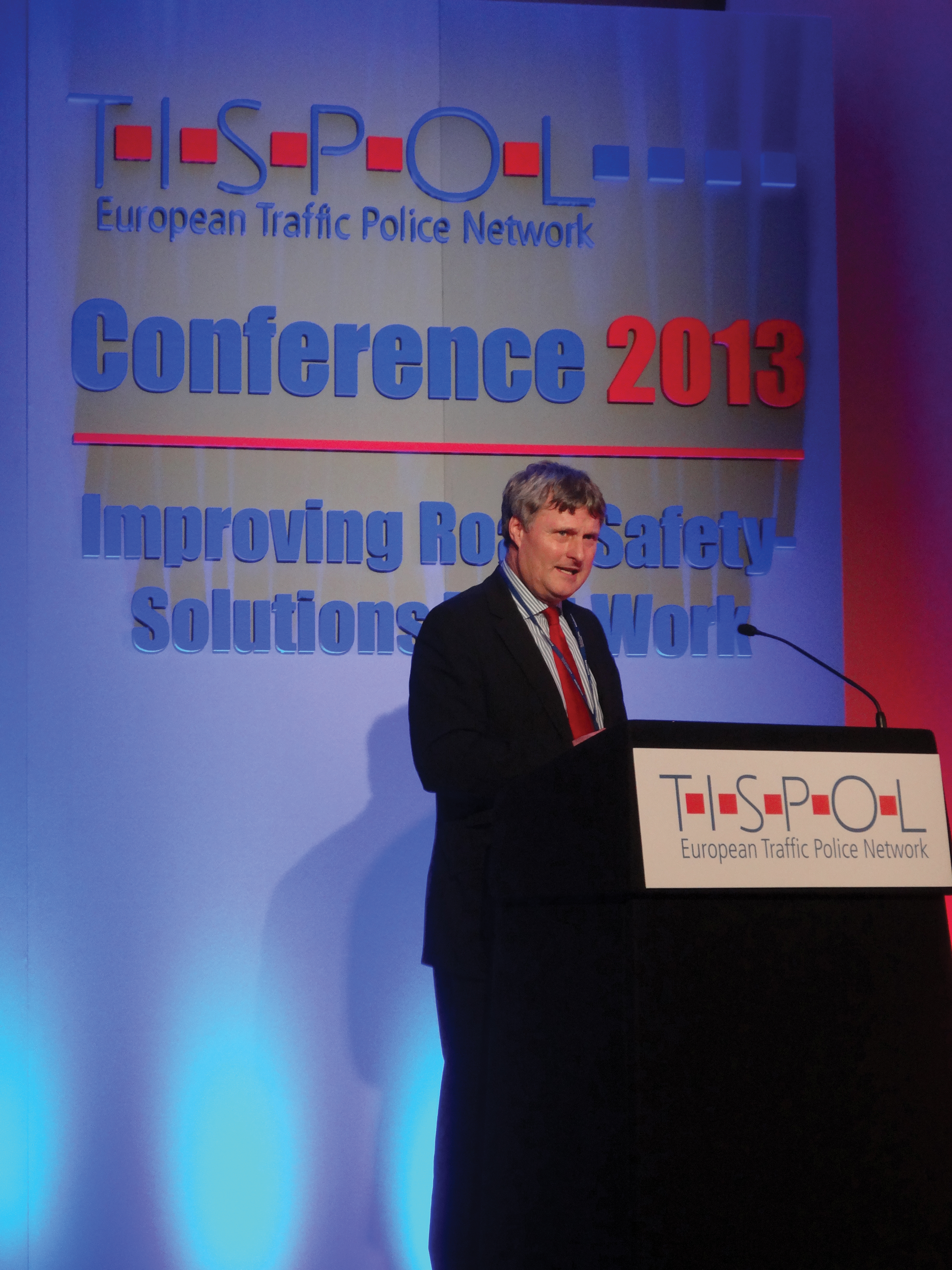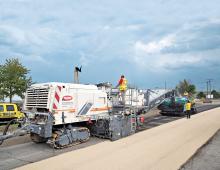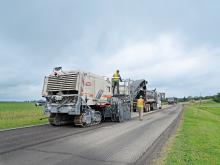Themed ‘Improving Road Safety – Solutions that Work’, the recent TISPOL (European Traffic Police Network) Conference 2013 in Manchester refocused efforts to improve road safety across Europe, while outlining future initiatives to drive down road accident levels even further – Guy Woodford reports Better cross-Europe cooperation between roads policing officers and thorough use of existing roads policing laws are the best way to ensure good road safety across Europe, according to the chair of the European Pa

“The likeliness of dying in a road accident in the EU is roughly half as much as dying in a road accident in the US” - Szabolcs Schmidt
Themed ‘Improving Road Safety – Solutions that Work’, the recent TISPOL (European Traffic Police Network) Conference 2013 in Manchester refocused efforts to improve road safety across Europe, while outlining future initiatives to drive down road accident levels even further – Guy Woodford reports
Better Cross-Europe cooperation between roads policing officers and thorough use of existing roads policing laws are the best way to ensure good road safety across Europe, according to the chair of the European Parliament Committee for Transport and Tourism, Brian Simpson.
Speaking on a video shown to the 220 delegates from 34 countries at the4753 TISPOL 2013 Conference, the North West England MEP said, “I think the Parliament’s view is we need to have a more European-wide approach to the whole issue of road safety. Member states jealously guard their own rights and initiatives on road safety, and we feel that is a kind of Brake on making even better progress on making our roads safer.
“We want better European cooperation, better Cross-border enforcement, and also better working together among police forces so we can actually reduce the death tolls on our roads even further.”
Simpson said he was “not wedded” to the idea that brand new roads policing laws are required. “What I am wedded to is the idea that the existing laws should be enforced. If you look across Europe, you can clearly see there is a divide between those countries who are strictly enforcing road traffic regulations, and those who have it as less of a priority.”
Of the need to reduce injuries as well as deaths from road accidents, Simpson added, “We’ve got to reduce the accidents. You reduce the accidents, you reduce the death rate. You reduce the accidents, you reduce the injury rate. What we’ve also got to look at the non-motorists who are part of the statistics of being injured, who just happen to be walking down a path or riding their bicycle [when they become involved in a vehicle accident].”
The 2013 TISPOL Conference heard how TISPOL has spearheaded the move to create a Europe-wide cross-border enforcement structure, making drivers accountable for traffic violations in other member countries, rather than just their own.
“We have to have cross-border cooperation and enforcement in order to ensure safer roads throughout the European Union, otherwise it become a lottery. A lottery that says you can be a foreign driver in Britain and just bolt home and not be brought to book.”
Koen Ricour, TISPOL president, emphasised TISPOL’s saving lives and detecting crime priorities and highlighted the success of the some of its biggest enforcement operations.
“Losing lives is not far away from TISPOL. Only a couple of weeks ago we had really tragic news from our colleague in Poland who lost a son in a traffic accident. For us, it’s not only work business. It’s also TISPOL family business.
“We are in a crisis situation now. Everywhere we see budgets being cut down, less people [police] on the streets, so we need to be even more efficient and effective. Road safety, for TISPOL, is still number one. But it is about making efficient use of our resources. Through safety we can get security. The outside world expects that we cannot check a car only for safety and not see the body in the trunk!”
Run from 1 June 2008 to 31 May 2011, TISPOL’s Lifesaver project focused on six European member states – Hungary, Poland, Portugal, Romania, Slovenia and Spain - and assisting them in their road traffic enforcement work. Ricour highlighted the project’s impressive results. In the period 2008-2010, road deaths in Hungary fell 25%, in Poland by 28%, in Portugal by 16%, in Romania by 22%, in Spain by 20% and in Slovenia road deaths fell 35%.
“It was one of the biggest projects we ever did and was really highly successful,” he said.
Relaying to delegates TISPOL data from its enforcement operations January 2012-June 2013, Ricour said there were 2.6 million traffic offence detections. Within the overall figure, there were almost two million speeding offences detected, 320,000 seat belt/child restraint offences, almost 250,000 truck and bus infringements, more than 6,000 drug driving offences, and 43,000 drink driving offences – from almost three million people being checked.
On crime detections over the same 18-month period, Ricour said there were 274 firearm offence detections and 500 stolen goods offence detections.
Szabolcs Schmidt, head of the European Commission’s road safety unit, said how the European Commission’s creation in the 1990s of a road safety database, which includes in-depth Europe-wide accident statistics, and the EU’s setting in 2001 of a target to reduce member state road fatalities by 50% by 2010, subsequently updated to a 50% reduction from 2011 to 2020, have been key to focusing efforts on improving European road safety.
“We can say very proudly that the EU has become global leader in terms of road safety,” said Schmidt. “If you simply take the latest figures, 1.24 million people [a year] are dying around the globe in road accidents. The latest figure for the EU is in the range of 28,700 [a year]. We have roughly 8% of the [world’s] population, and less than 2.5% of the road fatalities. The likeliness of dying in a road accident in the EU is roughly half as much as dying in a road accident in the US.”
Despite the EU’s performance on road safety compared to other world regions, Schmidt said there were big differences in road accident levels between certain European countries.
“A number of countries are performing quite well: France, Hungary and Finland, for example. Then there are other countries that are leading the road, improving our statistics: Sweden, the UK, the Netherlands and Ireland. Then there are countries that are really suffering from bad road safety performance, with Romania, Poland and Greece within that group. Those countries that are performing well have a good road safety strategy and action plan in place, which are supported at a national level by all the important actors.”
Schmidt said the European Commission was highly active in promoting road safety – particularly in urban areas, where accident levels tend to be higher. “We have a recent White Paper, from 2011, the so-called ‘Vision Zero’. We would like to go to zero road fatalities and are developing a series of policy initiatives to support this.” The policy initiatives, said Schmidt, focused on enforcement, education, state of road infrastructure, state of the management of road infrastructure, the state of the vehicles, and the development of intelligent transport systems. Another initiative will focus on vulnerable road users.
Of the EU Directive 2011-82, due to become law on November 7 2013, making it mandatory for a roads policing department from one EU member state to report one or more of eight specific traffic offences committed in their country by a national from another EU member state to the roads policing department in the offender’s native country, Schmidt added, “This is something like a small revolution. We have a couple of bilateral agreements, but we have nothing across the EU which regulates that those who commit an infringement cannot escape.”
The Directive applies to offences of speeding; non-use of a Seat belt; failing to stop at a red traffic light; drink driving; driving under the influence of drugs; failing to wear a safety helmet; use of a forbidden lane; and illegally using a mobile phone or any other communication device while driving.
Among a host of other high calibre road safety-minded speakers during the two-day conference on October 1-2 were Klaus Machata, of the Austrian Road Safety Board, who talked about The European Best Point Project; and Bernd Heller, deputy head of the road policing department in North Rhine, Westphalia, Germany, who gave a presentation on the Development of the 24-Hour Speed Enforcement Campaign.
An exhibition of the latest road safety technology and their applications was held during the event. Among companies taking part were1134 Siemens, 342 Topcon and 3957 Vysionics.
Better Cross-Europe cooperation between roads policing officers and thorough use of existing roads policing laws are the best way to ensure good road safety across Europe, according to the chair of the European Parliament Committee for Transport and Tourism, Brian Simpson.
Speaking on a video shown to the 220 delegates from 34 countries at the
“We want better European cooperation, better Cross-border enforcement, and also better working together among police forces so we can actually reduce the death tolls on our roads even further.”
Simpson said he was “not wedded” to the idea that brand new roads policing laws are required. “What I am wedded to is the idea that the existing laws should be enforced. If you look across Europe, you can clearly see there is a divide between those countries who are strictly enforcing road traffic regulations, and those who have it as less of a priority.”
Of the need to reduce injuries as well as deaths from road accidents, Simpson added, “We’ve got to reduce the accidents. You reduce the accidents, you reduce the death rate. You reduce the accidents, you reduce the injury rate. What we’ve also got to look at the non-motorists who are part of the statistics of being injured, who just happen to be walking down a path or riding their bicycle [when they become involved in a vehicle accident].”
The 2013 TISPOL Conference heard how TISPOL has spearheaded the move to create a Europe-wide cross-border enforcement structure, making drivers accountable for traffic violations in other member countries, rather than just their own.
“We have to have cross-border cooperation and enforcement in order to ensure safer roads throughout the European Union, otherwise it become a lottery. A lottery that says you can be a foreign driver in Britain and just bolt home and not be brought to book.”
Koen Ricour, TISPOL president, emphasised TISPOL’s saving lives and detecting crime priorities and highlighted the success of the some of its biggest enforcement operations.
“Losing lives is not far away from TISPOL. Only a couple of weeks ago we had really tragic news from our colleague in Poland who lost a son in a traffic accident. For us, it’s not only work business. It’s also TISPOL family business.
“We are in a crisis situation now. Everywhere we see budgets being cut down, less people [police] on the streets, so we need to be even more efficient and effective. Road safety, for TISPOL, is still number one. But it is about making efficient use of our resources. Through safety we can get security. The outside world expects that we cannot check a car only for safety and not see the body in the trunk!”
Run from 1 June 2008 to 31 May 2011, TISPOL’s Lifesaver project focused on six European member states – Hungary, Poland, Portugal, Romania, Slovenia and Spain - and assisting them in their road traffic enforcement work. Ricour highlighted the project’s impressive results. In the period 2008-2010, road deaths in Hungary fell 25%, in Poland by 28%, in Portugal by 16%, in Romania by 22%, in Spain by 20% and in Slovenia road deaths fell 35%.
“It was one of the biggest projects we ever did and was really highly successful,” he said.
Relaying to delegates TISPOL data from its enforcement operations January 2012-June 2013, Ricour said there were 2.6 million traffic offence detections. Within the overall figure, there were almost two million speeding offences detected, 320,000 seat belt/child restraint offences, almost 250,000 truck and bus infringements, more than 6,000 drug driving offences, and 43,000 drink driving offences – from almost three million people being checked.
On crime detections over the same 18-month period, Ricour said there were 274 firearm offence detections and 500 stolen goods offence detections.
Szabolcs Schmidt, head of the European Commission’s road safety unit, said how the European Commission’s creation in the 1990s of a road safety database, which includes in-depth Europe-wide accident statistics, and the EU’s setting in 2001 of a target to reduce member state road fatalities by 50% by 2010, subsequently updated to a 50% reduction from 2011 to 2020, have been key to focusing efforts on improving European road safety.
“We can say very proudly that the EU has become global leader in terms of road safety,” said Schmidt. “If you simply take the latest figures, 1.24 million people [a year] are dying around the globe in road accidents. The latest figure for the EU is in the range of 28,700 [a year]. We have roughly 8% of the [world’s] population, and less than 2.5% of the road fatalities. The likeliness of dying in a road accident in the EU is roughly half as much as dying in a road accident in the US.”
Despite the EU’s performance on road safety compared to other world regions, Schmidt said there were big differences in road accident levels between certain European countries.
“A number of countries are performing quite well: France, Hungary and Finland, for example. Then there are other countries that are leading the road, improving our statistics: Sweden, the UK, the Netherlands and Ireland. Then there are countries that are really suffering from bad road safety performance, with Romania, Poland and Greece within that group. Those countries that are performing well have a good road safety strategy and action plan in place, which are supported at a national level by all the important actors.”
Schmidt said the European Commission was highly active in promoting road safety – particularly in urban areas, where accident levels tend to be higher. “We have a recent White Paper, from 2011, the so-called ‘Vision Zero’. We would like to go to zero road fatalities and are developing a series of policy initiatives to support this.” The policy initiatives, said Schmidt, focused on enforcement, education, state of road infrastructure, state of the management of road infrastructure, the state of the vehicles, and the development of intelligent transport systems. Another initiative will focus on vulnerable road users.
Of the EU Directive 2011-82, due to become law on November 7 2013, making it mandatory for a roads policing department from one EU member state to report one or more of eight specific traffic offences committed in their country by a national from another EU member state to the roads policing department in the offender’s native country, Schmidt added, “This is something like a small revolution. We have a couple of bilateral agreements, but we have nothing across the EU which regulates that those who commit an infringement cannot escape.”
The Directive applies to offences of speeding; non-use of a Seat belt; failing to stop at a red traffic light; drink driving; driving under the influence of drugs; failing to wear a safety helmet; use of a forbidden lane; and illegally using a mobile phone or any other communication device while driving.
Among a host of other high calibre road safety-minded speakers during the two-day conference on October 1-2 were Klaus Machata, of the Austrian Road Safety Board, who talked about The European Best Point Project; and Bernd Heller, deputy head of the road policing department in North Rhine, Westphalia, Germany, who gave a presentation on the Development of the 24-Hour Speed Enforcement Campaign.
An exhibition of the latest road safety technology and their applications was held during the event. Among companies taking part were
| 2008 | 2009 | 2010 | Reduction | |
|---|---|---|---|---|
| Hungary | 996 | 822 | 739 | 25% |
| Poland | 5437 | 4572 | 3907 | 28% |
| Portugal | 885 | 840 | 741 | 16% |
| Romania | 3063 | 2796 | 2377 | 22% |
| Slovenia | 214 | 171 | 138 | 35% |
| Spain | 1928 | 1696 | 1548 | 20% |










